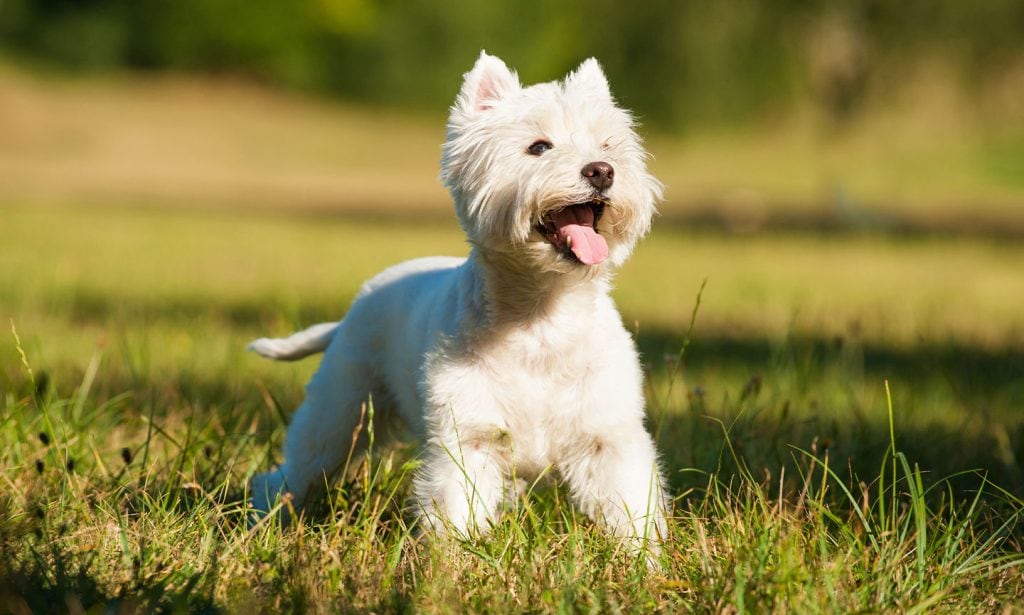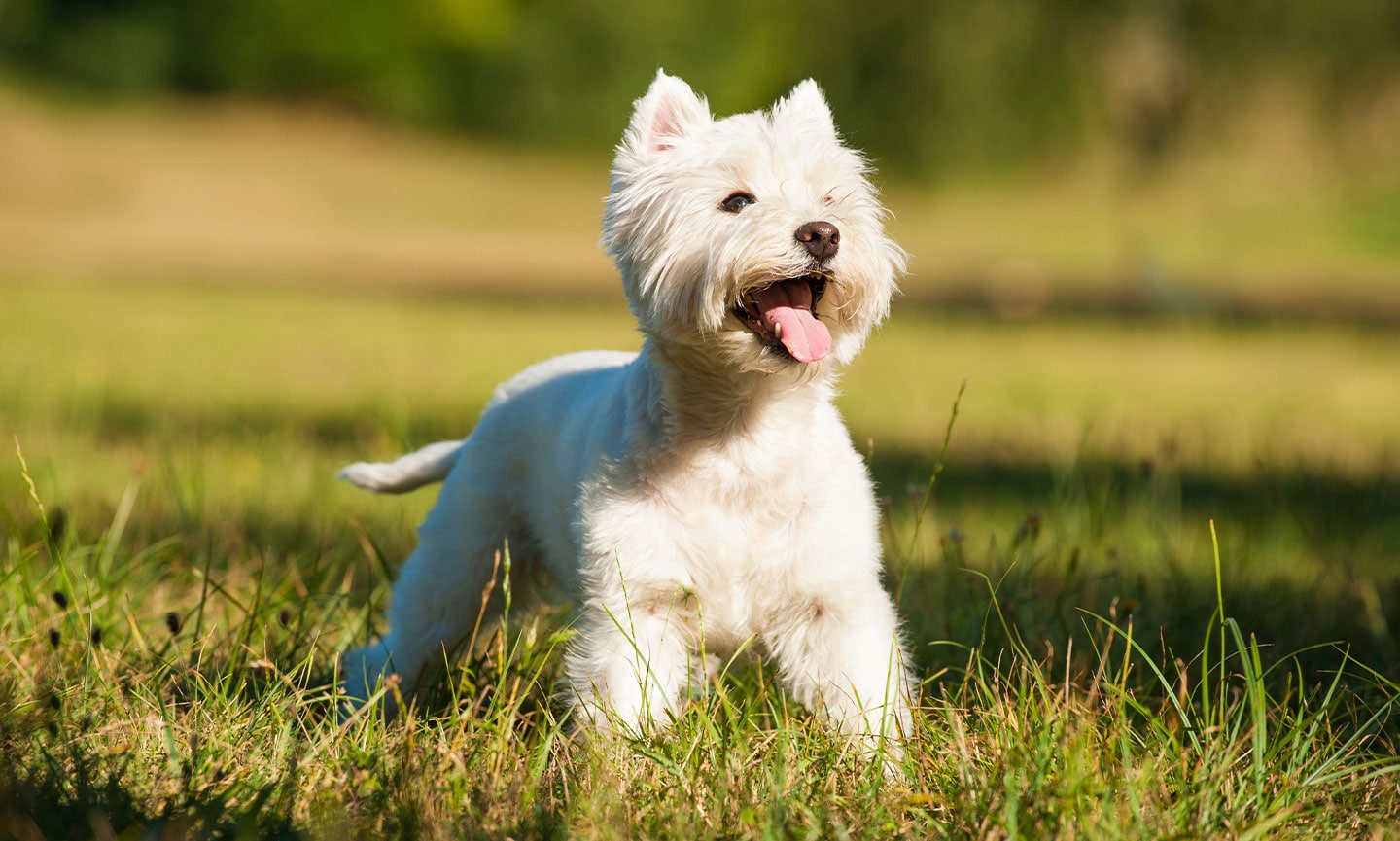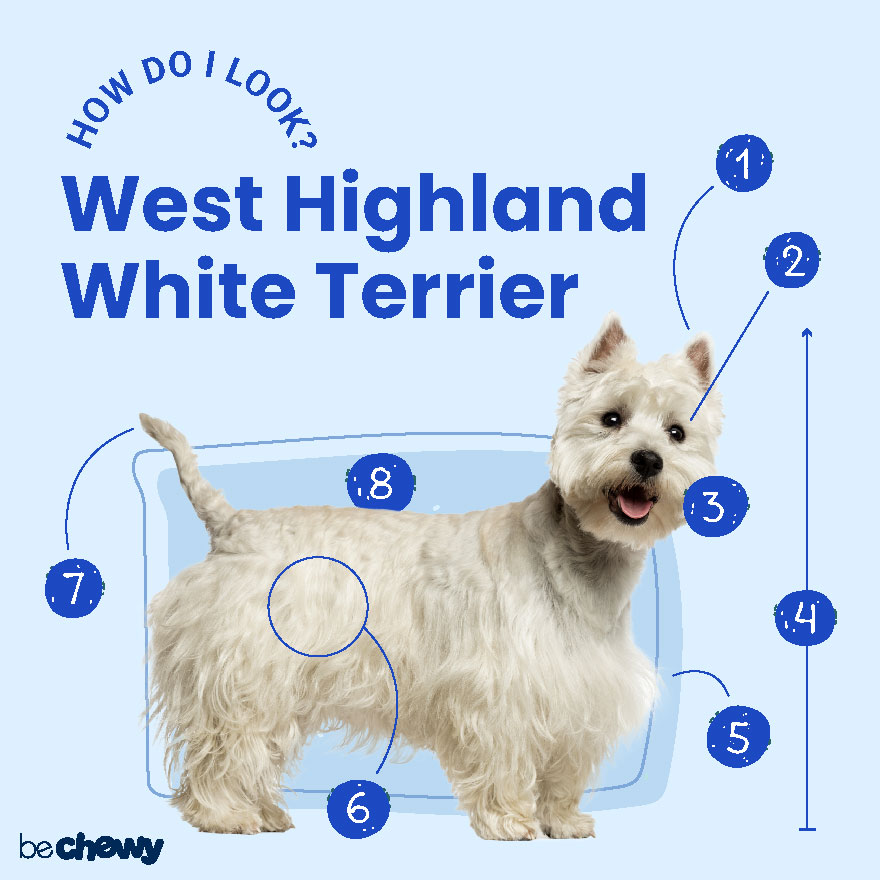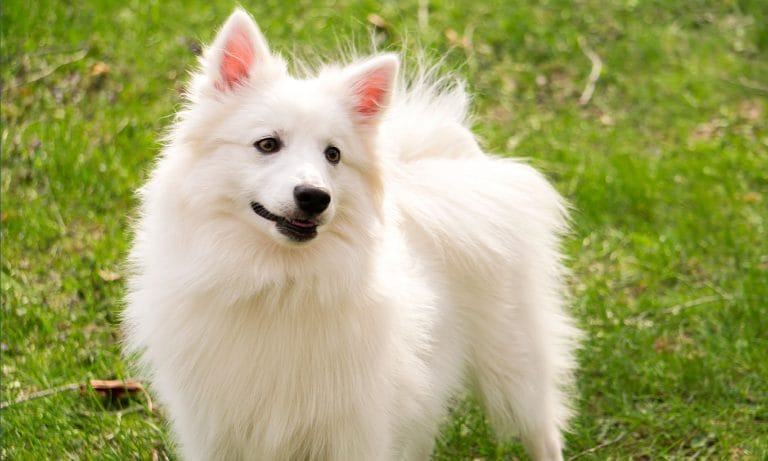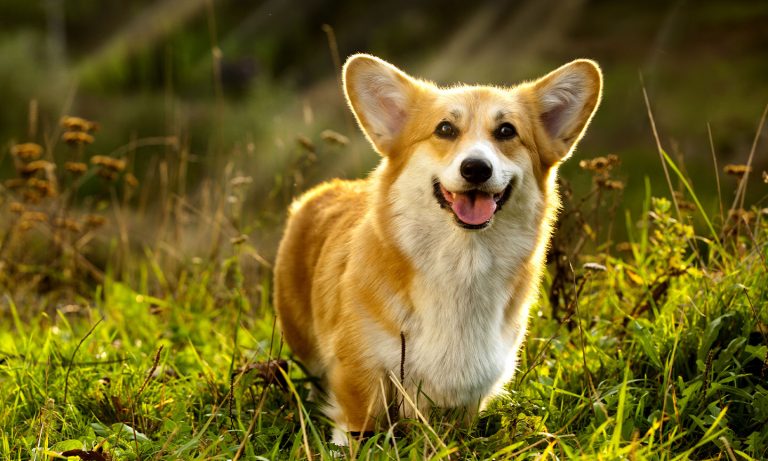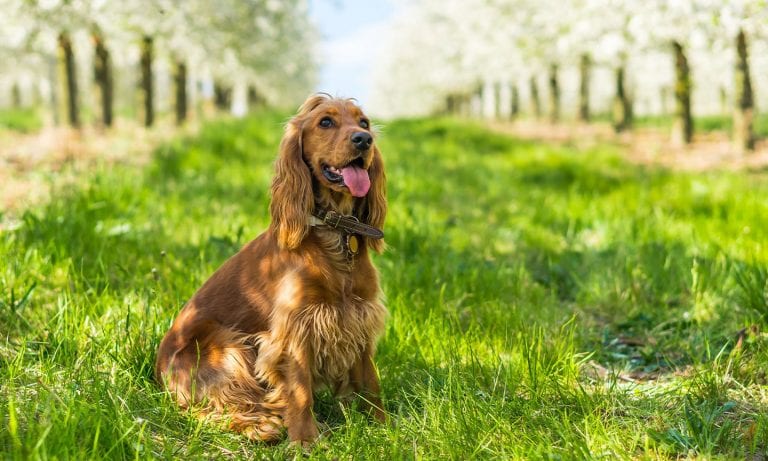Cute and feisty is an apt description of your new Westie bestie. West Highland White Terriers (commonly referred to as Westies) are a big personality wrapped in a little package. These pups don’t back down, and that includes a “discussion” on whether it’s time for walk or not. These independent, confident and energetic dogs may seem a little cocky, but they’re a friendly, playful dog at heart who loves nothing more than being the center of your world.
Breed Snapshot
Temperament:
ConfidentIndependentLivelyCoat Color:
White
Best For
West Highland White Terriers are spirited, friendly pups who require regular grooming and daily exercise. They thrive in active homes with attentive pet parents who appreciate their playful nature and can provide consistent training.
West Highland White Terrier Temperament
Westies are active dogs who pack a lot of life and love into that small frame. They’re like that popular girl in high school who was student council president, captain of the field hockey team, took all honors classes, remembered everyone’s birthday and made a mean red velvet cupcake. Not only are they a friendly, cheerful pet, Westies are confident, smart and tenacious.
Outgoing and loyal, the Westie dog loves to be the center of attention and will keep you entertained with their energetic antics. These dogs love to play games like chase and fetch and show off all the tricks they know. But if they don’t get the exercise they need, those antics can become… less entertaining. You may find them chasing other animals, digging in your yard or barking a lot.
They are good dogs for families with older kids, but can do well with younger children if they’re trained and socialized properly at a young age (and as long as the kids in their life are taught to play gently with them). Don’t expect a Westie to be your lapdog, though. Like all terriers bred to hunt vermin, they have a feisty, independent streak and could get frustrated if someone invades their space too often.
Care should be taken when introducing Westies to other pets. The West Highland White Terrier puppy can learn to adjust, especially if socialized from puppyhood. If you’re bringing an older Westie into a multi-pet home, it’s best to consult with a certified dog trainer with experience of West Highland White Terrier types to help with the transition. Westies also have a strong prey drive that could send them chasing after smaller pets. These behaviors can be tempered through training, but it does take time and commitment.
Westies won’t hesitate to sound the bark alarm (again and again) at a passing leaf or when visitors come to the door, but that rarely translates into aggression. Rather, once your visitor has settled in, your Westie will want to become their new best friend and show off their antics for a new audience.
How to Care for a West Highland White Terrier
Raising a West Highland White Terrier takes time and commitment. Their grooming needs are plentiful, especially if you want to maintain that distinctive show-dog look. Training is also a must; with their keen intellect, abundant energy and powerful hunting instincts, Westies need the mental and physical stimulation that training provides.
West Highland White Terrier Health
Westies have a lifespan of 13 to 15 years and are generally regarded as a healthy breed, thanks in large part to responsible breeding practices. However, there are a few health problems that pet parents should be on the lookout for.
- Craniomandibular Osteopathy (CMO): Craniomandibular osteopathy (or Lion Jaw) is an inherited condition that causes noncancerous bone growth on the lower jawbone. For Westie puppies with this condition, symptoms can start appearing anywhere between 1 to 10 months of age and include pain or difficulty opening the mouth, difficulty chewing, jaw swelling and excessive drooling. The condition is painful but use of anti-inflammatories, soft foods and close monitoring by your veterinarian can determine if a “wait and see” approach or if surgery will be needed. Around 1 year of age the puppy, and jaw, slows down growing and recession of the jaw can be seen, but some dogs will need surgery.
- Luxating Patella: A luxating patella (or kneecap) is a shift in the knee’s stability due to the movement of the patella over the joint. This is a common finding for many smaller breeds, Westies included, and can present as hind limb lameness. Symptoms to look for include walking stiffly or awkwardly, extending the leg while resting, or kicking the leg off to the side in an attempt to reset the knee. Skipping is also commonly noted by pet parents. There are a variety of treatments available depending upon the severity of the condition, such as icing the knee, taking joint supplements or medication, physical therapy and surgery for severe cases.
- Hip Dysplasia: Hip dysplasia is a degenerative disease that is caused by instability of the hip joint. It’s often seen in larger dog breeds, however in some Westie lines it is also very prevalent. This condition can be seen in both puppies and dogs with symptoms including lameness, “bunny hopping” gait, difficulty standing, running, jumping, difficulty getting up from rest, climbing stairs and even pain/vocalization as it progresses. Early diagnosis is helpful to focus on limiting pain and the progression of arthritis of the joint. Use of medications (pain management and anti-inflammatories), exercise or physical therapy, joint support supplements and diet, can help support the joint, and surgical interventions are used in severe cases. Reputable breeders often screen their dogs for this disorder to prevent it from being passed on.
- Legg-Calve-Perthes Disease: Another hip disorder that can affect West Highland White Terriers is Legg-Calve-Perthes Disease. This condition, which is thought to be hereditary, occurs when the head of the femur begins to degenerate. The primary symptom is limping, which may progress to lameness if left untreated. Medication, physical therapy and surgery are common treatment options.
- Atopic Dermatitis: The Westie is predisposed to developing atopic dermatitis, a skin condition triggered by allergens in the pet’s environment. Dogs with this condition will often scratch, rub their bodies on furniture or the floor, licking their paws, or shake their head and bodies in efforts to alleviate the itchiness. Some mild cases can be managed by medicated baths, topical ointment, antihistamines and/or supplements. More severe cases may require the use of immunotherapy, corticosteroids or immunosuppressive medication.
West Highland White Terrier History
The West Highland White Terrier origin traces back to Scotland where they were bred to hunt rats and other vermin. For hundreds of years, the Westie and other small terriers were used in homes and on farms to keep the pest populations under control. While we don’t know exactly when the Westie got their start, there’s evidence of their existence dating back to the 1500 to 1600s.
The typical Westie traits come from their history as rat hunters. With their sharp intellect, high energy, strong prey drive, high speed and powerful sense of smell, farmers and landholders were able to train Westies to track, chase and eliminate vermin. Their brash confidence helped in the hunt, too; Westies refused to back down when faced with their prey, regardless of their size.
The West Highland White Terrier began their second career as show dogs later in their history. Even though they’d been around for hundreds of years, their first official showing didn’t occur until 1896 at a Scottish dog show. Just 10 years later, in 1906, Westies made their first appearance at an American Kennel Club show. The first official AKC registration of a West Highland White Terrier soon followed in 1908.
Often a favorite of dog show judges, the Westie has also enjoyed mainstream popularity. The breed has consistently ranked in the top third of all dog breeds in the United States. Thanks to the breed’s popularity, Westie breeders are abundant with the current cost of a puppy ranging from $1,500 to $2,000. But for that price, you’re likely getting a pup who’s been screened for health and temperament issues and may come with pedigree papers. If you’re interested in raising a West Highland White Terrier, you can find reputable breeders at the AKC marketplace. You can also contact a Westie rescue, keep an eye out at your local animal shelter or search Chewy’s database of adoptable dogs in your area if you’re interested in adopting a West Highland White Terrier.
FAQs
Are Westies hypoallergenic?
No dog is truly hypoallergenic, but compared to most other breeds, Westies shed very little. That makes them a pretty good choice for people with allergies.
Do Westies bark a lot?
Yes, Westies tend to bark a lot. Like many other terriers, Westies are a vocal breed. They tend to alarm bark at unfamiliar sounds and visitors, which makes them a decent watchdog.
What are the most popular Westie dog names?
Many pet parents like to use Scottish names in honor of the breed’s heritage. Popular Westie names include: Alba, Bonnie, Fiona, Nessie, Angus, Brody, Fergus and Jock. Those are just a few options; you can get more dog names here.
Are Westies good family dogs?
Westies make great family dogs in homes with children. They do have an independent streak, however, so small children should be taught to not to handle them too much.
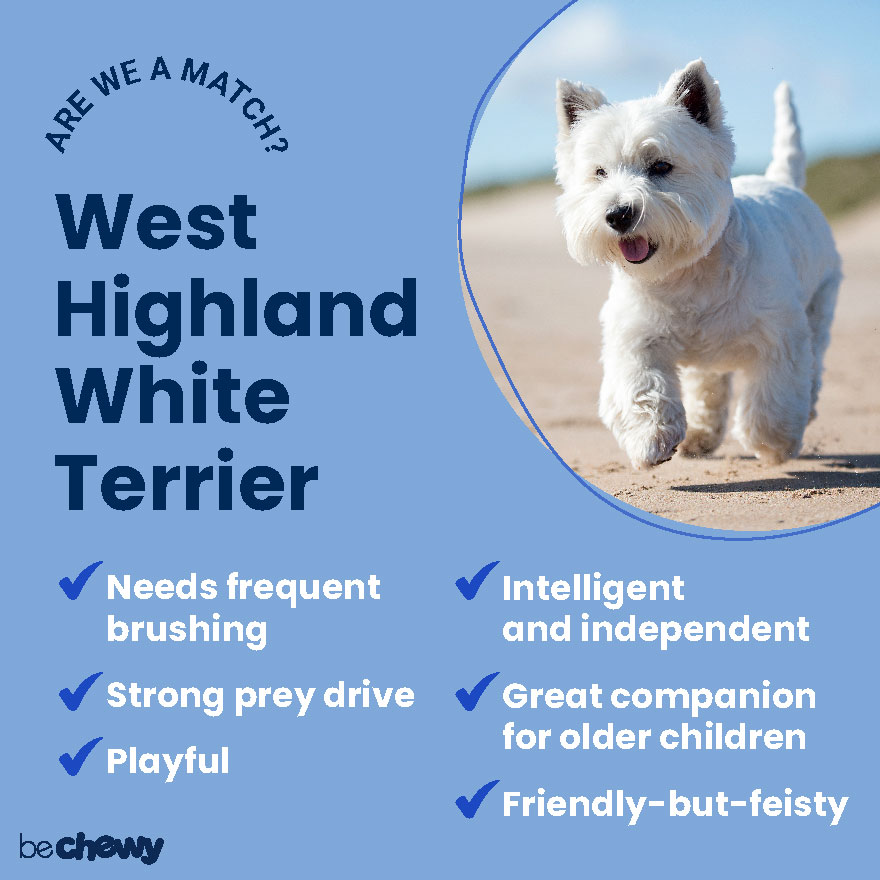
Top Takeaways
Adorable and feisty, West Highland White Terriers are great pets for families with older children (or younger children who know the meaning of “personal space”). These loyal, affectionate and intelligent dogs will love to entertain you with their antics, show off their skills and make memories with you for a lifetime.
Expert input provided by: veterinarians Dr. Anthony Hall and Dr. Dimple Hall; certified dog trainers Allison Lamminen, Matt Schimsky and Beth Mullen; and Katherine Houpt VMD PhD DACVB of Cornell University who conducts research on the behavior and welfare of domestic animals.
Breed characteristic ratings provided by veterinarian Dr. Sarah J. Wooten, DVM, CVJ, a veterinarian at Sheep Draw Veterinary Hospital in Greeley, Colorado; dog trainer and behavior consultant Irith Bloom, CPDT-KSA, CBCC-KA, CDBC, owner of The Sophisticated Dog, LLC, in Los Angeles; and certified animal behavior consultant Amy Shojai, CABC, in Sherman, Texas.
The health content was medically reviewed by Chewy vets.

Search for Adoptable West Highland White Terriers Near You
Top West Highland White Terrier Names
These are the top West Highland White Terrier names as chosen by Chewy's pet parents!
Female Names
- Piper
- Lucy
- Daisy
- Bella
- Winnie
- Maggie
- Molly
- Luna
- Fiona
- Ellie
Male Names
- Winston
- Finn
- Archie
- Max
- Oliver
- Cooper
- Ollie
- Duncan
- Finley
- Murphy
Share:
